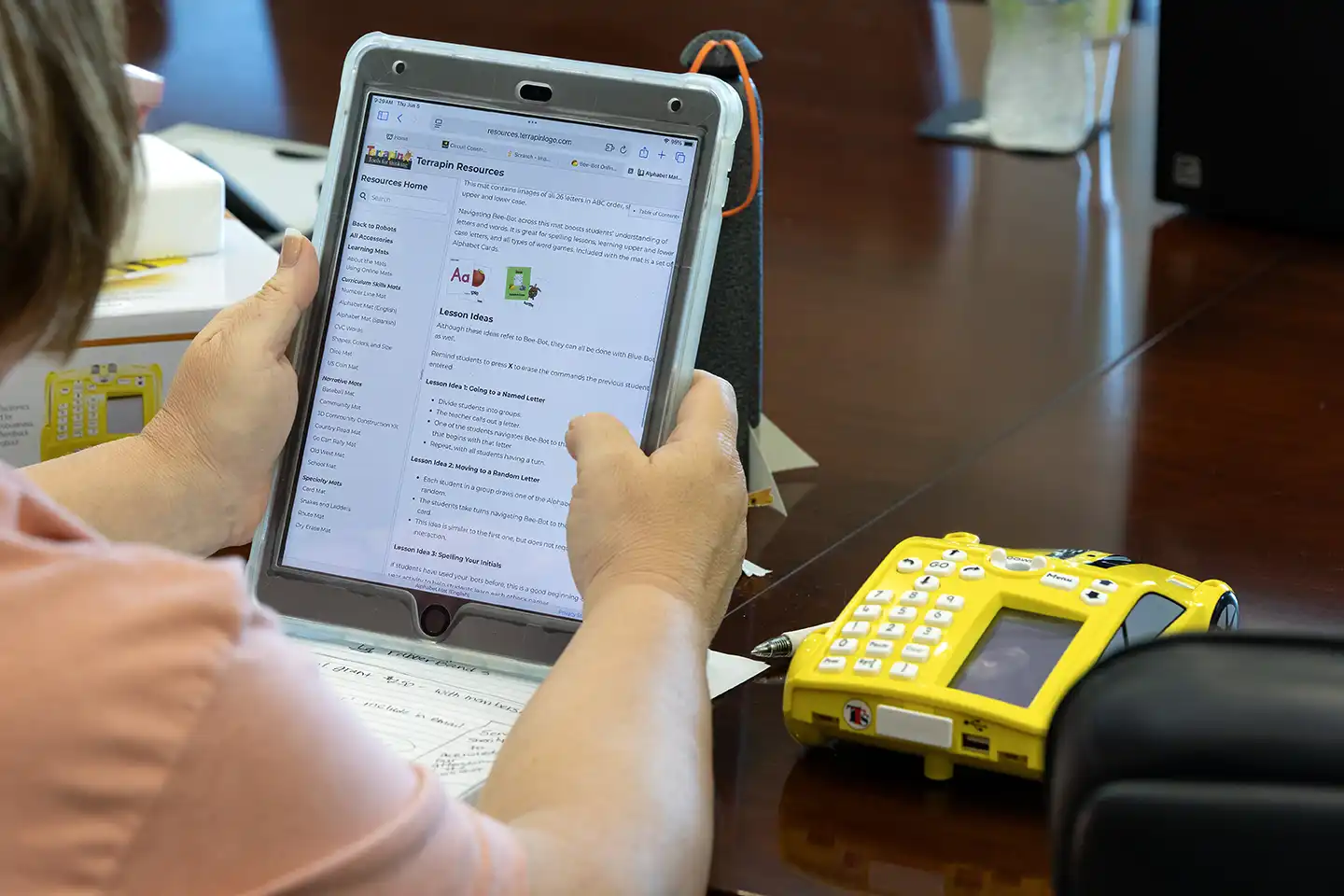
Transforming lesson planning in just one day: ORISE hosts “What’s all the Buzz about?” professional development course
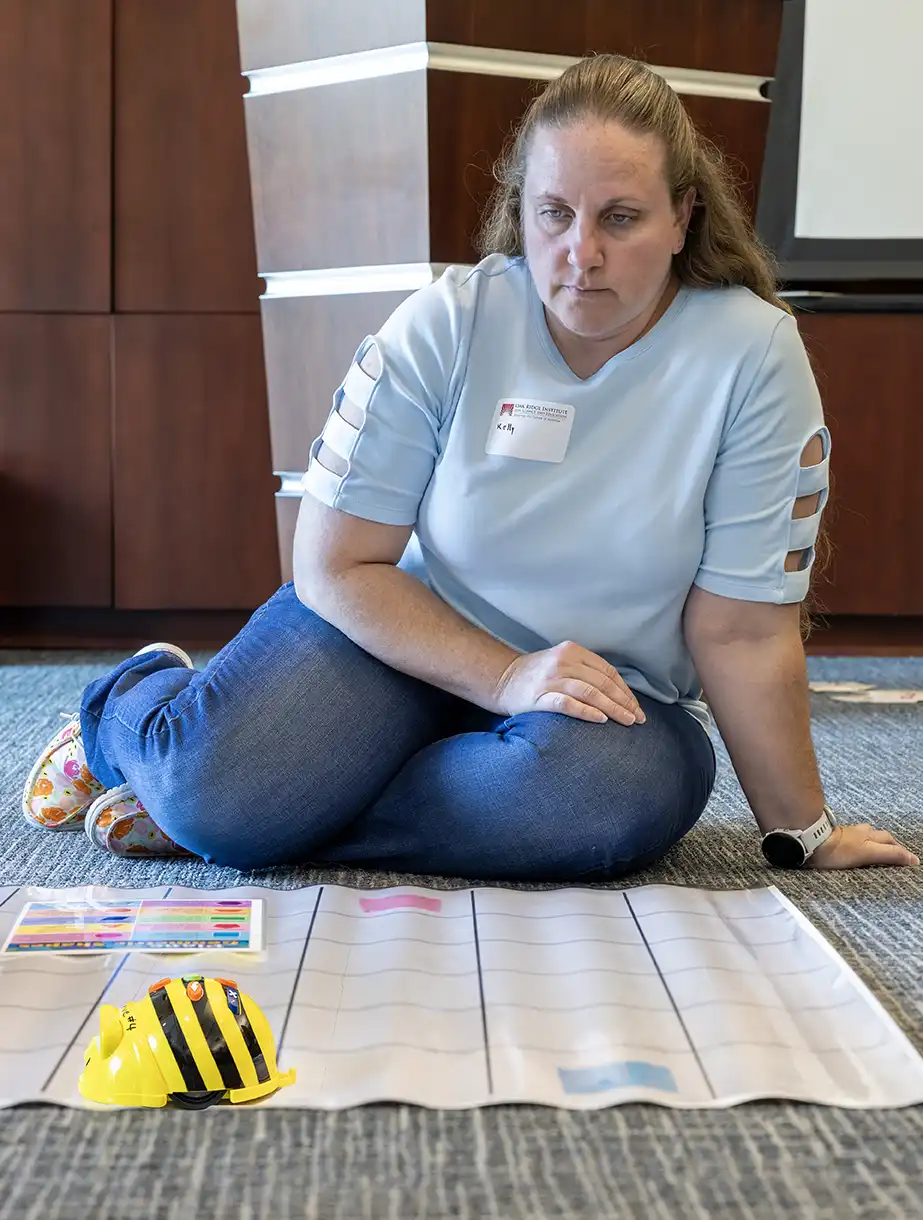
Kelly Wright plays with a BeeBot during What’s All the Buzz about course hosted by ORISE.
Professional development courses for teachers can be viewed in different ways. Some might see a group of East Tennessee educators spending seven hours of their summer vacation fulfilling continuing education requirements. Others might recognize the incredible opportunity these educators have to transform their approach to lesson planning in just one day. For those who attended the What’s all the Buzz about? course hosted by ORISE on June 5, 2025, the latter perspective couldn’t be more accurate.
A course that covers it all
From the course description alone, it’s clear this isn’t your average professional development session:
What’s all the Buzz about? You won’t bee-lieve the difference a day can make!
Target Audience: K-8th Grade Teachers
Get hands-on exploration as you use STREAM resources to create low-prep, high-impact lesson plans to accommodate diverse student abilities, promoting collaboration, creativity, and problem-solving. Inspire the next generation and learn to program (Binary Code, Code.org, Scratch Programming, Snap Circuits, BeeBots, Probots and more).
Bonus: Model Rocketry with Maj Hoover. Each participant builds and takes home a Goddard Rocket.
The concept of STREAM expands on traditional STEM education, adding disciplines like research (or wRiting) and art to science, technology, engineering, and math. The course’s playful tagline, “bee-lieve,” references BeeBots—coding robots that participants explored during the session.
Hands-on learning that inspires educators
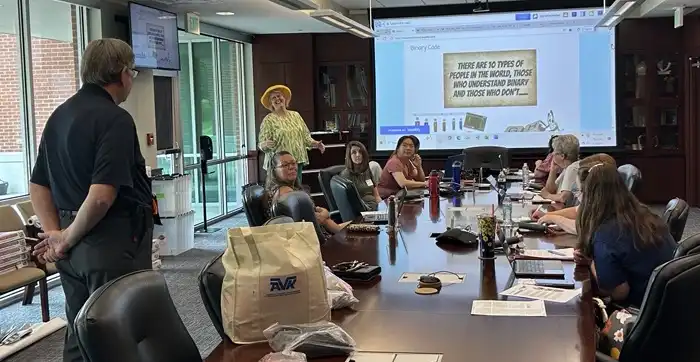
Maj. David Hoover (front left) talks with educators during What’s all the Buzz about course.
The course drew not only teachers but also professionals who work with children, like Kelly Wright, a certified occupational therapy assistant for Knox County Schools. Wright registered for the course in search of new ideas to motivate her students.
“There’s a lot going on, but it’s all so fun,” Wright said during a class break. “It’s all hands-on, which is great. I have loved playing with the BeeBots and getting different ideas for things I can do with my students. It’s been great just bouncing ideas off the instructors and each other.”
From programming with binary code (using only 0s and 1s) to building rockets, participants explored free resources and cost-effective projects designed to inspire children of all abilities.
Rocketry and the “Wow” factor
One of the session’s highlights was led by Maj. David Hoover, Aerospace Education Officer with the Civil Air Patrol. Hoover taught participants how to build a Goddard rocket using simple materials like foam rubber, plastic straws, rubber bands, and zip ties.
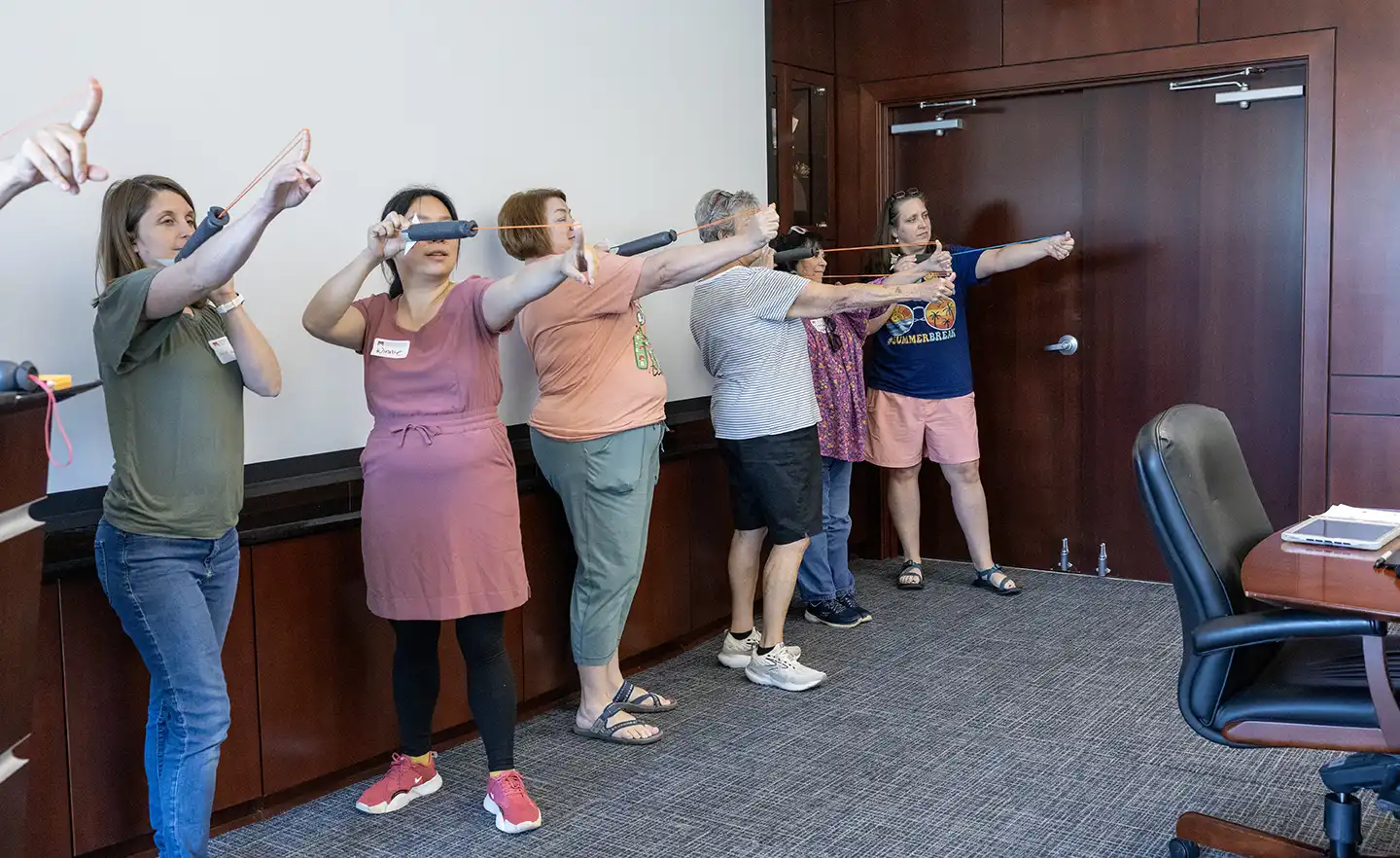
Teachers launch the Goddard rockets they built in the What’s all the Buzz about professional development course.
“What’s going to be that triggering factor to get you excited about science, technology, engineering, and math?” Hoover asked. “What is going to be the ‘wow’ factor that inspires someone to be the first person to step on Mars? That’s what we’re hoping to do—hit that excitement point.”
Hoover also shared that the Civil Air Patrol has been providing free STEM kits to educators since 2013 to spark interest in fields like aviation, space, and cyber. “Some people have said that the Civil Air Patrol is the best-kept secret. We don’t want to be that!” Hoover laughed. “We’re showing educators and parents how easy it is to put together something that is not expensive to excite their kids.”
Wright shared her enthusiasm for the rocket-building activity, describing it as both simple and affordable. “It was actually really easy and very inexpensive, and I think we can have fun just trying to get our students to shoot these rockets or aim for targets. It’s hands-on science, and it’s going to be a huge hit,” she said.
The why
Throughout the day, participants explored a wide range of resources, tips, and tricks, including ways to access free supplies and support for their classrooms. While the sheer volume of ideas could feel overwhelming at first, Wright noted that breaking it down into manageable pieces made it more approachable. “There’s a lot of stuff here—a lot of ideas—but once you break it down, it’s not so much,” she explained.
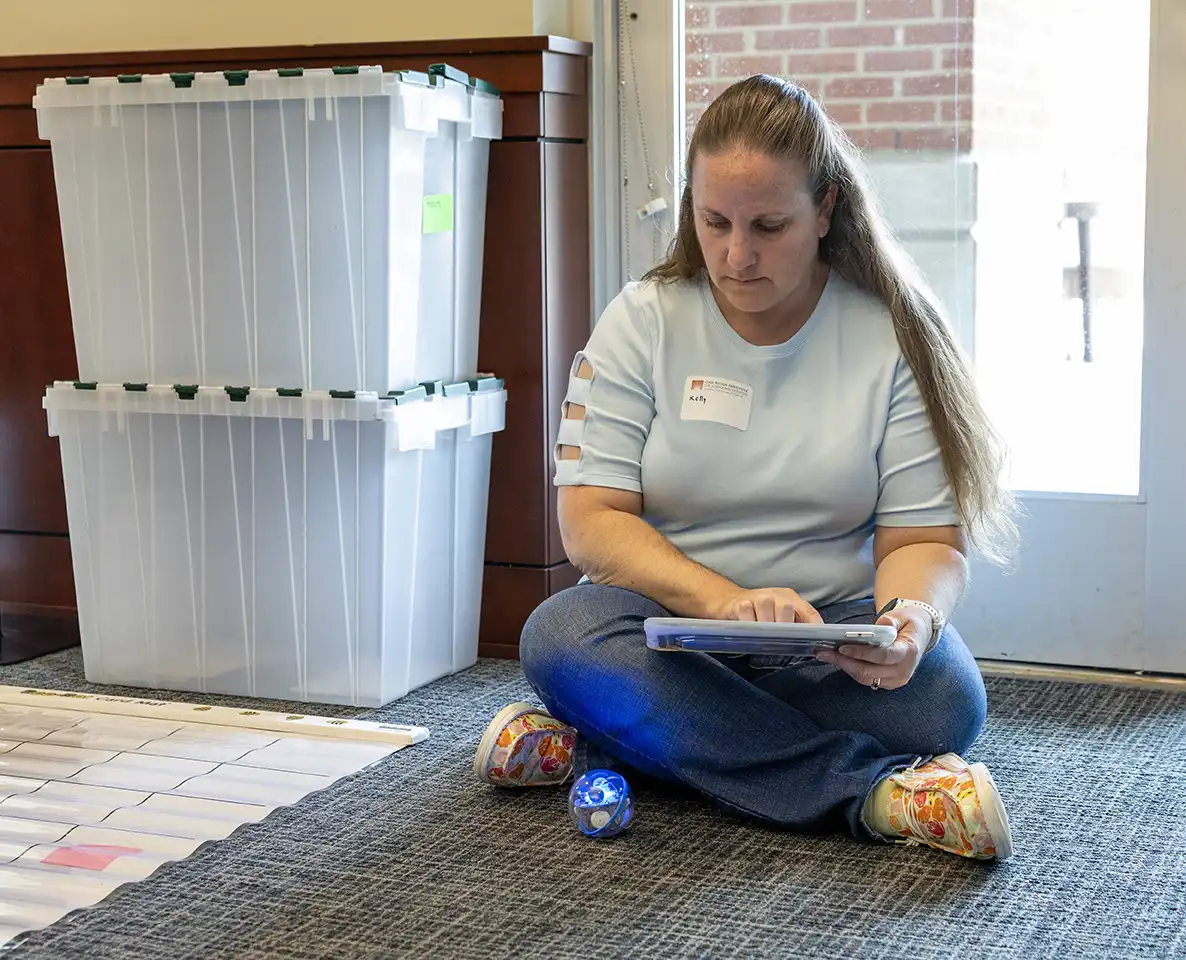
Kelly Wright plays with new resources during What’s all the Buzz about course.
For Wright, the course wasn’t just about learning new techniques; it was about opening doors for her students. She became emotional as she reflected on how hands-on STEM activities could create opportunities for children with diverse abilities. Wright shared a personal story about her son, who has autism, and how he lit up with excitement after attending a robotics competition. “I’ve seen firsthand how these kinds of activities can inspire kids, and I’m hopeful that these new methods of learning will do the same for others,” she said.
If you missed the What’s all the Buzz about? course, but are interested in exploring the STEM kits offered by the Civil Air Patrol, you can find more information on their website: Civil Air Patrol Stem Kit Program | Civil Air Patrol National Headquarters.
Media Contacts
Pam Bonee
Director, Communications
Phone: 865.603.5142
pam.bonee@orau.org
Wendy West
Manager, Communications
Phone: 865.207.7953
wendy.west@orau.org
The Oak Ridge Institute for Science and Education (ORISE) is a U.S. Department of Energy (DOE) asset that is dedicated to enabling critical scientific, research, and health initiatives of the department and its laboratory system by providing world class expertise in STEM workforce development, scientific and technical reviews, and the evaluation of radiation exposure and environmental contamination.
ORISE is managed by ORAU, a 501(c)(3) nonprofit corporation and federal contractor, for DOE’s Office of Science. The single largest supporter of basic research in the physical sciences in the United States, the Office of Science is working to address some of the most pressing challenges of our time. For more information, please visit science.osti.gov.

